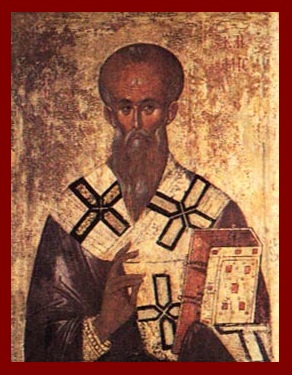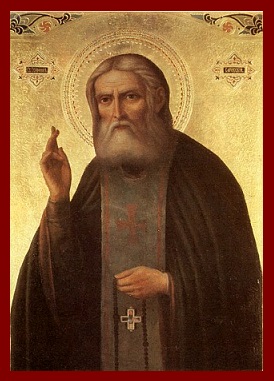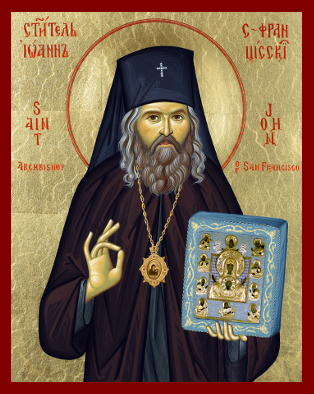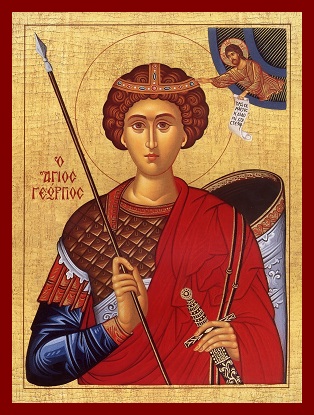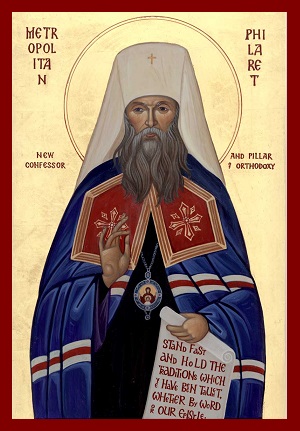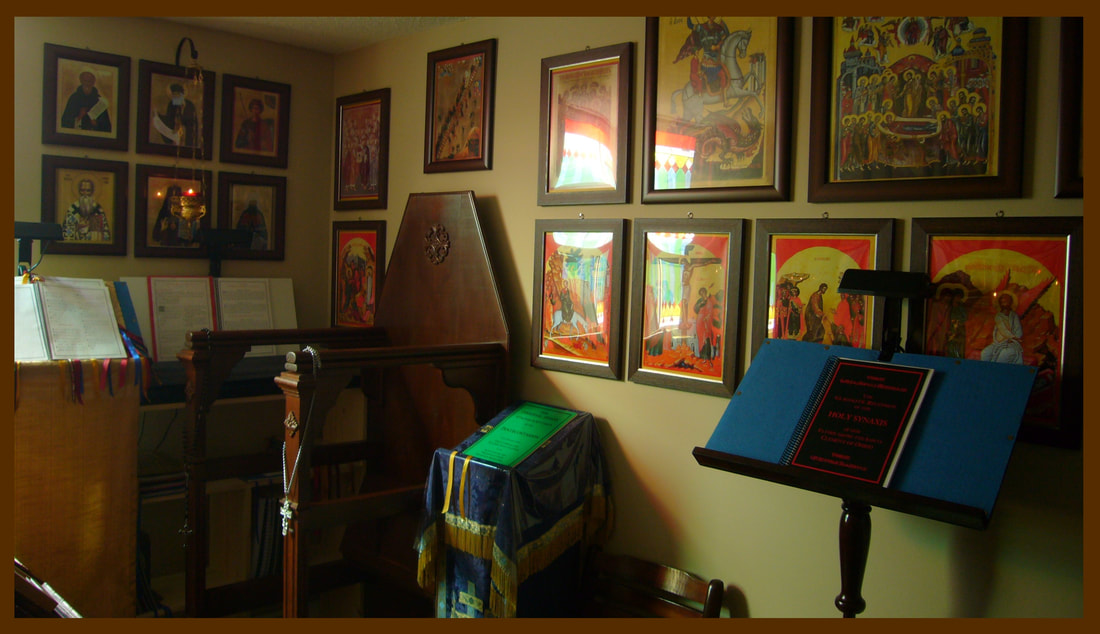THE ELEVATION OF THE TRIUMPHANT CROSS OF OUR LORD JESUS CHRIST
|
DESIRING to locate the Precious Cross of our Lord Jesus Christ, upon which He was crucified on Golgotha three centuries prior, Empress Helen, the mother of Constantine the Great, set out for Jerusalem. Negotiating with those knowledgeable of the area as to its possible location, a new and previously unknown fragrant flowering plant growing on the spot was discovered, and consequently named Basil (βασιλικός), which in Greek means royal or kingly, honouring the Lord, the King of Glory. From this grew the liturgical tradition to adorn the cross with sprigs of the basil herb amongst other flowers. In 326AD, after the miracles of the infirm woman being cured, and the dead man restored to life, from which arises the adjective Life-giving, the True Cross, amongst the three, was discovered or found. The name of the Solemnity of the Invention of the Cross is derived from the Latin invenire, meaning to find, or discover, and it is commemorated annually on 3 May. The Empress commissioned that a temple be constructed on the site, which was dedicated in 335AD as the Church of the Holy Sepulchre. The Solemnity of the Elevation of the Triumphant Cross, observed on 14 September,
|
commemorates both the finding of the Cross, as well as the recovery of a large portion of the relic of the True Cross in 628AD, which had been carried away as a war prize by the Persians when they sacked Jerusalem in 614AD. On both liturgical festivals, the Holy Cross was lifted high for the faithful to behold and venerate while the Kyrie Eleison was repeatedly sung. The adjective of triumphant for the Cross does not suggest an earthly victory, but a spiritual one, in which evil is overcome by virtue, and death is crossed over into eternal life. The Cross for us is also seen in the metaphor of The Spiritual Ladder, by which we ascend from our fallen state upward to unending gladness in paradise.
Refrain of the Akathist Hymn:
BEHOLD, the all-precious Wood of the Life-giving and most blessed Cross.
On Solemnities of the Cross:
WE venerate Thy Cross, O Lord; and Thy holy Resurrection we praise and glorify.
Refrain of the Akathist Hymn:
BEHOLD, the all-precious Wood of the Life-giving and most blessed Cross.
On Solemnities of the Cross:
WE venerate Thy Cross, O Lord; and Thy holy Resurrection we praise and glorify.
OUR PRIMARY PATRONS
1. Our Father Among the Saints Abbot Benedict of Nursia
|
THE Founding Father of monasticism in the West, the future Abbot Benedict quickly abandoned his secular studies in favour of a monastic life. Miracles attracted the attention of others, and each time he fled the gaze of men. Hidden away from them in a mountain cave near Subiaco, he lived a life of strict asceticism and prayer. After some years, he was asked to become the abbot of the monastery nearby, and seeing this as the Will of God, he accepted. But his spiritual trials did not cease, and the evil one, out of envy at the holiness of this venerable monk, tried in various ways to destroy him, the most noted being when he was given a poison cup to drink, from which the Lord delivered him. After years of a solitary life, he became the Abbot of a great
|
community and founded several monasteries, writing his famous Rule for the guide of all monastics. He reposed peacefully in the Lord in 543. In our kalendar, as a western saint, he is commemorated on 21 March. In our community, upon the paraman, we have inscribed his prayer of exorcism.
The Prayer of Saint Benedict: Latin:
GET thee behind me satan, VADE retro satana,
Suggest not vain things to me; Nunquam suade mihi vana;
The cup thou profferest me is evil, Sunt mala quae libas,
Drink thou thine own poison. Ipse venena bibas.
Paraman Version: Balkanske:
GET thee behind me satan, Nosi od mene satano,
Tempt me not with thy pride; Ne iskusavaj me so oholoscu tvojom;
For thou art a scandal unto me, Zato ti si k meni sablazan,
And by the Cross art thou cast out. I za krstom si izbacen.
And: Latin:
MAY the holy Cross be my light: Crux sacra sit mihi lux:
Let not the dragon be my guide. Nunquam draco sit mihi dux.
Refrain of the Akathist Hymn:
REJOICE, O venerable Abbot Benedict, our heavenly patron.
At Compline:
V. Our holy Father and Patron Benedict:
R. Pray to God for us.
The Prayer of Saint Benedict: Latin:
GET thee behind me satan, VADE retro satana,
Suggest not vain things to me; Nunquam suade mihi vana;
The cup thou profferest me is evil, Sunt mala quae libas,
Drink thou thine own poison. Ipse venena bibas.
Paraman Version: Balkanske:
GET thee behind me satan, Nosi od mene satano,
Tempt me not with thy pride; Ne iskusavaj me so oholoscu tvojom;
For thou art a scandal unto me, Zato ti si k meni sablazan,
And by the Cross art thou cast out. I za krstom si izbacen.
And: Latin:
MAY the holy Cross be my light: Crux sacra sit mihi lux:
Let not the dragon be my guide. Nunquam draco sit mihi dux.
Refrain of the Akathist Hymn:
REJOICE, O venerable Abbot Benedict, our heavenly patron.
At Compline:
V. Our holy Father and Patron Benedict:
R. Pray to God for us.
2. Our Father Among the Saints Archbishop Clement of Ohrid
|
EXPELLED from Great Moravia for use of the Slavic Liturgy written with the Glagolitic alphabet, Father Clement returned to his native Bulgaria where he was welcomed to preach the Gospel and help Christianise the inhabitants there, becoming the first hierarch to teach there in the Slavonic language, which began to replace the liturgical Greek, continuing the missionary work of his teachers, the renowned brothers Saints Cyril and Methodius, Apostles to the Slavs. After time, he was elevated to the bishopric of Ohrid in what is now Macedonia, where he founded a monastery. He is considered the first author of the Slavic language building upon the previous work of his ecclesiastical predecessors. He left behind his own spiritual compositions and translations, and created the basis
|
of a new alphabet for the Slavic peoples, which he named after his teacher, Saint Cyril of Thessalonica. We commemorate Saint Clement as our heavenly protector, he who guarded his flock against the heretical influences of new Latin theologies, and who defended, against persecution, the use of the Slavonic liturgy.
Refrain of the Akathist Hymn:
REJOICE, O righteous Father Clement, our blessed Protector.
At Compline:
V. Our holy Father and Protector Clement:
R. Pray to God for us.
Refrain of the Akathist Hymn:
REJOICE, O righteous Father Clement, our blessed Protector.
At Compline:
V. Our holy Father and Protector Clement:
R. Pray to God for us.
OUR SECONDARY PATRONS
1. Our Father Among the Saints Elder Seraphim of Sarov
|
ACQUIRE the spirit of peace, and then thousands of souls will be saved around you.
THIS renowned phrase of the venerable one is surely a desire for monastics, and indeed of every Christian. As our guide, our Elder, and our heavenly intercessor, we turn to him as a model for the life of self-denial and asceticism. Born in the southern provinces of Russia, this youth longed for God, His Church, and salvation from his earliest days. He knew instantly that worldly life held no interest for him, and with the blessing of his parents, entered the Sarov monastery, and placed himself directly under obedience. Burning with desire for even closer union with the angelic life, after several years he withdrew to become an ascetic and hermit, guided by the rudder of prayer and the virtue of the |
acquisition of the Holy Spirit. Denying himself every comfort and allurement, he became a severe faster, a clairvoyant, an untiring pillar of prayer, and yet still, a loving spiritual Father. Words could not contain the intense devotion he had for the Holy Spirit, the Theotokos, and, in essence, the entire spiritual life and reality of heaven.
Refrain of the Akathist Hymn:
REJOICE, O venerable Father Seraphim, our holy guide and Elder.
At Compline:
V. Our holy Father Elder Seraphim:
R. Pray to God for us.
Refrain of the Akathist Hymn:
REJOICE, O venerable Father Seraphim, our holy guide and Elder.
At Compline:
V. Our holy Father Elder Seraphim:
R. Pray to God for us.
2. Our Father Among the Saints Archbishop John of Shanghai
|
NEVER, never, never let anyone tell you that, in order to be Orthodox, you must be Eastern. The West was fully Orthodox for a thousand years, and her venerable liturgy is far older than any of her heresies.
THIS was the ever-memorable response of Archbishop John when approached on the topic of the restoration of the Orthodox rites of the West and their abandoned beauty that he valued and supported throughout his life, and indeed which we, in our own way, endeavour to uphold. This chosen one of God, for those unfamiliar with his legacy, began life as a pious youth who eventually rose in the monastic and clerical ranks to be regarded as a protector of orphans, an exemplary for liturgical prayer, a true shepherd of his rational flock, a compassionate and model teacher, a man of |
sanctity untouched by corruption, our gracious benefactor, and a powerful heavenly intercessor. His simplicity, purity and humility are the very virtues that we must pray for, and strive to emulate in our own monastic struggles in an ever-hostile world that has once again lost its spiritual heritage by reason of rebellion and apostasy.
Refrain of the Akathist Hymn:
REJOICE, O holy Wonderworker John, our helper amid misfortunes.
At Compline:
V. Our holy Father Wonderworker John:
R. Pray to God for us.
Refrain of the Akathist Hymn:
REJOICE, O holy Wonderworker John, our helper amid misfortunes.
At Compline:
V. Our holy Father Wonderworker John:
R. Pray to God for us.
OUR TERTIARY PATRONS
1. Our holy Intercessor Great-martyr George of Lydda
|
BORN into a Christian family in Cappadocia in the late third century, the youthful George, as did his father, sought a career in the military. Due to his charisma and skill, he quickly rose in the ranks and became a person of consequence. However, when the edict of Emperor Diocletian meant the systematic persecution of Christians, the Tribune George knew it was time to witness for the Faith. Criticizing the imperial decision, he was marked as a traitor, and therefore subject to torture and finally beheading. His strength of conviction for the Truth caused others to convert from paganism, including the Empress Alexandra, herself having been later martyred. His body was returned to Lydda, and devotion to him so increased that he was given the title Great-martyr. He became the patron saint of various nations, and notably for us, those of
|
the Commonwealth, and his cross was woven into the national banner. The Dominion of Canada was established under this standard also, and hence, Trophy-bearer George, commemorated 23 April, is our patron not only due to our history, but also by reason of his belief in the True God, worshipped by right-believing Christians.
Refrain of the Akathist Hymn:
REJOICE, O holy Great-martyr George, our holy intercessor.
At Compline:
V. Our holy Intercessor Great-martyr George:
R. Pray to God for us.
Refrain of the Akathist Hymn:
REJOICE, O holy Great-martyr George, our holy intercessor.
At Compline:
V. Our holy Intercessor Great-martyr George:
R. Pray to God for us.
2. Our holy Father New-confessor Metropolitan Philaret of New York
|
HOLD that fast which thou hast.
THESE were the last words to be written by Blessed Metropolitan Philaret before his repose in 1985, which ended the earthly life of a pious Russian born in Kursk, who chose the spiritual life of a monastic, and by Providence, became a wise and prudent hierarch of the Church, a protector of his flock against heresy, and a Pillar of Orthodoxy defending the True Faith as received from the Apostles and the Church Fathers since the days of antiquity. As both the bow and the rudder of the vessel of Christ God, this kind shepherd, yet stern Ascetic, appealed to the other Churches to resist compromise, to guard against the danger of ecumenism, and hold fast to that which was passed down to us as priceless spiritual treasure, as apostolic tradition, and as sacred divine wealth forming the unshakeable bedrock of correct doctrine and right |
dogma of true Christianity. As a part of our ecclesiastical heritage, we honour him and beseech the intercessions of our God-bearing Father and New-confessor, whose mortal remains were found gloriously incorrupt, that we not waver upon the narrow path beset with temptation, but look only forward for the sake of our salvation.
Refrain of the Akathist Hymn:
REJOICE, O holy New-confessor Philaret, great defender of the Orthodox Church.
At Compline:
V. Our holy Father New-confessor Philaret:
R. Pray to God for us.
Refrain of the Akathist Hymn:
REJOICE, O holy New-confessor Philaret, great defender of the Orthodox Church.
At Compline:
V. Our holy Father New-confessor Philaret:
R. Pray to God for us.
Contact Information
|
Thank you for visiting our web pages.
We hope you have read through some of them and have been edified. Remember to pray the Prayer of the Divine Ladder unceasingly: LORD Jesus Christ, Son of God, have mercy on me a sinner. We wish you peace and many blessings. Glory to God for all things. Under the Mercy, The Brotherhood of ETC Monastery To contact us, please compose and send a message to Bishop Lazr at triumphantcrossmonastery@gmail.com We shall be glad to hear from you. |
Our current temporary location is Welland, Ontario, Canada, in the heart of the Niagara Peninsula. If the Lord wills it, we would be blessed indeed to obtain a modest semi-rural property and build a larger temple than the current oratory set aside for daily prayers. |




